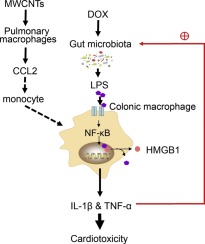当前位置:
X-MOL 学术
›
Toxicology
›
论文详情
Our official English website, www.x-mol.net, welcomes your
feedback! (Note: you will need to create a separate account there.)
Multi-walled carbon nanotubes exacerbate doxorubicin-induced cardiotoxicity by altering gut microbiota and pulmonary and colonic macrophage phenotype in mice.
Toxicology ( IF 4.8 ) Pub Date : 2020-02-14 , DOI: 10.1016/j.tox.2020.152410 Xiaoxiao Liu 1 , Yanzhuo Liu 1 , Xuewei Chen 2 , Chenlong Wang 3 , Xuehan Chen 1 , Wen Liu 1 , Keqing Huang 1 , Honglei Chen 4 , Jing Yang 1
Toxicology ( IF 4.8 ) Pub Date : 2020-02-14 , DOI: 10.1016/j.tox.2020.152410 Xiaoxiao Liu 1 , Yanzhuo Liu 1 , Xuewei Chen 2 , Chenlong Wang 3 , Xuehan Chen 1 , Wen Liu 1 , Keqing Huang 1 , Honglei Chen 4 , Jing Yang 1
Affiliation

|
Epidemiologic studies show that the levels of air pollutants and particulate matter are positively associated with the morbidity and mortality of cardiovascular diseases. Here we demonstrate that the intratracheal instillation of multi-walled carbon nanotubes (MWCNTs), a standard fine particle, exacerbate doxorubicin (DOX)-induced cardiotoxicity in mice through altering gut microbiota and pulmonary and colonic macrophage phenotype. MWCNTs (25 μg/kg per day, 5 days a week for 3 weeks) promoted cardiotoxicity and apoptosis in the DOX (2 mg/kg, twice a week for 5 weeks)-treated C57BL/6 mice. MWCNTs exaggerated DOX-induced gut microbiota dysbiosis characterized by the increased abundances of Helicobacteraceae and Coriobacteriaceae. In addition, MWCNTs promoted DOX-induced M1-like polarization of colonic macrophages with an increase in TNF-α, IL-1β and CC chemokine ligand 2 in peripheral blood. Importantly, treatment with the antibiotics attenuated MWCNTs plus DOX-induced apoptosis of cardiomyocytes and M1-like polarization of colonic macrophages. The fecal microbiota transplantation demonstrated that MWCNTs exaggerated DOX-induced cardiotoxicity with M1-like polarization of colonic macrophages. The conditioned medium from MWCNTs-treated pulmonary macrophages promoted DOX-induced gut microbiota dysbiosis and colonic macrophage polarization. Furthermore, the co-culture of macrophages and fecal bacteria promoted M1-like macrophage polarization and their production of TNF-α and IL-1β, and thereby exacerbated the effects of MWCNTs. Moreover, IL-1β and TNF-α blockade, either alone or in combination attenuated MWCNTs-exacerbated cardiotoxicity. In summary, MWCNTs exacerbate DOX-induced cardiotoxicity in mice through gut microbiota and pulmonary and colonic macrophage interaction. Our findings identify a novel mechanism of action of inhaled particle-driven cardiotoxicity.
中文翻译:

多壁碳纳米管通过改变小鼠肠道菌群以及肺和结肠巨噬细胞表型,加剧了阿霉素诱导的心脏毒性。
流行病学研究表明,空气污染物和颗粒物的含量与心血管疾病的发病率和死亡率呈正相关。在这里,我们证明气管内滴注多壁碳纳米管(MWCNTs),一种标准的细颗粒,通过改变肠道菌群以及肺和结肠巨噬细胞表型,加剧了阿霉素(DOX)诱导的小鼠心脏毒性。MWCNTs(每天25μg/ kg,每周5天,连续3周)促进了DOX(2 mg / kg,每周两次,连续5周)对C57BL / 6小鼠的心脏毒性和细胞凋亡。MWCNTs夸大了DOX诱导的肠道菌群失调,其特征是幽门螺杆菌和肠杆菌科细菌的丰度增加。此外,MWCNTs促进DOX诱导的结肠巨噬细胞M1样极化,并增加TNF-α,外周血中的IL-1β和CC趋化因子配体2。重要的是,用抗生素治疗可减弱MWCNTs以及DOX诱导的心肌细胞凋亡和结肠巨噬细胞的M1样极化。粪便微生物群移植证明,MWCNTs夸大了DOX诱导的心脏毒性,使结肠巨噬细胞呈M1型极化。MWCNTs处理的肺巨噬细胞的条件培养基促进了DOX诱导的肠道菌群营养不良和结肠巨噬细胞极化。此外,巨噬细胞和粪便细菌的共培养促进了M1样巨噬细胞的极化及其TNF-α和IL-1β的产生,从而加剧了MWCNT的作用。此外,IL-1β和TNF-α的单独或联合阻滞减弱了MWCNT加重的心脏毒性。综上所述,MWCNTs通过肠道微生物群以及肺和结肠巨噬细胞的相互作用加剧了DOX诱导的小鼠心脏毒性。我们的发现确定了吸入颗粒驱动的心脏毒性的新型作用机制。
更新日期:2020-02-20
中文翻译:

多壁碳纳米管通过改变小鼠肠道菌群以及肺和结肠巨噬细胞表型,加剧了阿霉素诱导的心脏毒性。
流行病学研究表明,空气污染物和颗粒物的含量与心血管疾病的发病率和死亡率呈正相关。在这里,我们证明气管内滴注多壁碳纳米管(MWCNTs),一种标准的细颗粒,通过改变肠道菌群以及肺和结肠巨噬细胞表型,加剧了阿霉素(DOX)诱导的小鼠心脏毒性。MWCNTs(每天25μg/ kg,每周5天,连续3周)促进了DOX(2 mg / kg,每周两次,连续5周)对C57BL / 6小鼠的心脏毒性和细胞凋亡。MWCNTs夸大了DOX诱导的肠道菌群失调,其特征是幽门螺杆菌和肠杆菌科细菌的丰度增加。此外,MWCNTs促进DOX诱导的结肠巨噬细胞M1样极化,并增加TNF-α,外周血中的IL-1β和CC趋化因子配体2。重要的是,用抗生素治疗可减弱MWCNTs以及DOX诱导的心肌细胞凋亡和结肠巨噬细胞的M1样极化。粪便微生物群移植证明,MWCNTs夸大了DOX诱导的心脏毒性,使结肠巨噬细胞呈M1型极化。MWCNTs处理的肺巨噬细胞的条件培养基促进了DOX诱导的肠道菌群营养不良和结肠巨噬细胞极化。此外,巨噬细胞和粪便细菌的共培养促进了M1样巨噬细胞的极化及其TNF-α和IL-1β的产生,从而加剧了MWCNT的作用。此外,IL-1β和TNF-α的单独或联合阻滞减弱了MWCNT加重的心脏毒性。综上所述,MWCNTs通过肠道微生物群以及肺和结肠巨噬细胞的相互作用加剧了DOX诱导的小鼠心脏毒性。我们的发现确定了吸入颗粒驱动的心脏毒性的新型作用机制。











































 京公网安备 11010802027423号
京公网安备 11010802027423号